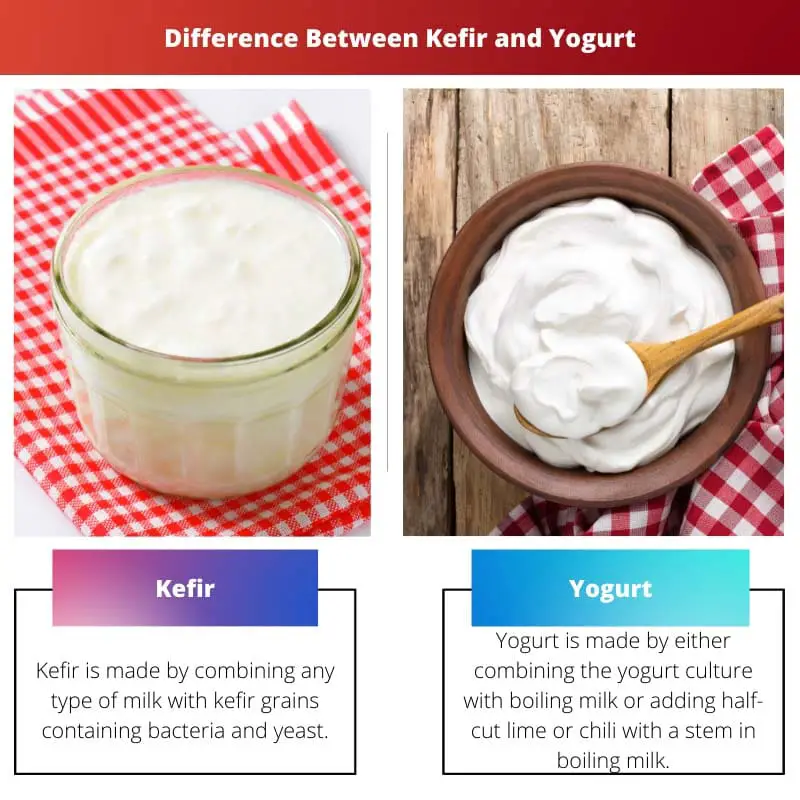Dairy is an essential part of the Indian diet. Be it milk, yogurt, cheese, paneer, curd, buttermilk, or desserts, and we never fail to include it in our daily meals.
Dairy is a vital source of calcium and vitamin D in our body which mainly helps our bone structure to strengthen itself. Though similar in nature, kefir and yogurt are two different dairy products with different advantages and uses.
Key Takeaways
- Kefir contains various probiotics and beneficial yeast, promoting better gut health and immunity.
- Yogurt has a thicker consistency and milder taste than kefir, which is thinner and tangier.
- Kefir is made using kefir grains and can be fermented at room temperature, while yogurt requires specific starter cultures and a controlled ferment temperature.
Kefir vs Yogurt
Kefir is a fermented dairy product that is made from kefir grains. Its consistency is light, refreshing and thin which includes all the ingredients from fermentation. This probiotic drink has beneficial effects on digestion, weight management and healthy gut. Kefir has a sour taste or a tart-like flavour. Yoghurt is a heavy and thick dairy product made from cultured bacteria. Milk turns into yoghurt when bacteria is introduced into milk. It is a rich source of calcium and protein.

Kefir is a probiotic beverage that is known for its advantages towards gut health. It can be made from various milk types ranging from cow, goat, sheep, and camel to rice, soy, and coconut.
Typically, kefir is made from kefir grains which is a combination of yeast and bacteria which develops on mixing with milk and forms the beverage called kefir.
On the other hand, yogurt is made out of a bacteria called the yogurt culture. It comprises the Lactobacillus Delbrueckii Subsp Bulgaricus and Streptococcus Thermophilus bacteria.
While some households use this bacteria, other households believe in using half-cut lemon or chilli with stem to ferment the boiled milk and make yogurt out of it.
Comparison Table
| Parameters of Comparison | Kefir | Yogurt |
|---|---|---|
| Procedure to make | Kefir is made by combining any type of milk with kefir grains containing bacteria and yeast. | Yogurt is made by either combining the yogurt culture with boiling milk or adding half-cut lime or chilli with a stem in boiling milk. |
| Nutrition Value | Kefir contains three times more probiotics than yogurt. | Yogurt is rich in calcium, phosphorus, proteins, and vitamins. |
| Consistency and Taste | Kefir is acidic, light, thin, and less creamy. It has a tart-like sour flavour to it. | Yogurt is thick, heavy, and creamy. It has a range of flavours varying from mild to tangy. |
| Fermentation Time | 14-18 hours | 2-4 hours |
| Uses | Kefir can be consumed as it is or combined with fresh fruits and vegetables to make smoothies or desserts. It is an excellent alternative to buttermilk. | Yogurt can be consumed as it is. It can also be customized with fruits, honey, granola, kale, etc. Yogurt can also be used in dishes including heavy cream bases like Thai Curry, Chicken Curry, or Paneer Curry. |
| Lactose Intolerant | Yes | Varies from person to person |
What is Kefir?
Kefir is a drink undergoing fermentation with a consistency comparable to yogurt. It was first originated in Karachay and Balkaria. Then it was sent to Russia and then spread to the rest of Europe and the United States.
Milk is the main component of kefir which helps boost our immunity and is healthy for the bones. The bacterial structure makes it good for gut health.
It is also safe for lactose intolerants and helps in constipation as well as upset stomach. It may even aid in combating cancer and diarrhoea along with parallel treatments.
Kefir has also been proven to help lose belly fat and excessive weight when consumed in appropriate quantities daily.
This fermented milk, a probiotic drink, is used by athletes and people with high cholesterol and obesity. Kefir might even help with symptoms of menopause like sleeplessness, anxiety, depression, dry and itchy scalp, irritability, and high heart rate.
However, everything is good when consumed within a certain limit. For kefir, the limit can be one to two cups per day. Going overboard with the drink might result in some side effects.
At the initial stages of consumption, it might cause constipation, excessive bloating, intestinal cramping, and nausea.

What is Yogurt?
Yogurt has become a favourite snack amongst the young generation due to its taste and health advantages. The dairy aisle is filled with yogurt ranging from low-fat yogurt, fat-free yogurt, and Greek yogurt to lactose-free yogurt and flavoured yogurt.
Yogurt was originated in the late 5000 BCE when it was considered the food of Gods when combined with honey. Yogurt is rich in calcium, Vitamin B, and riboflavin, which help regulate blood pressure, metabolism, teeth, and bone health.
Regular consumption of yogurt is also believed to improve the immune system, reduce inflammation and ease the digestive system from constipation or upset stomach.
Though this healthy breakfast option is high in protein and phosphorus, it has its disadvantages. Some packaged yogurt contains saturated fats, which increase the probability of heart disease.
It also lacks Vitamin D, which is proven vital for allergy prevention. Some flavoured brands also include added sugar which increases calorie intake and cholesterol.
People allergic to milk can also have severe bloating, swelling, cramps, heart diseases or cancer.
Hence, Yogurt can be included in our daily meals as it leads to weight loss and better health advantages. Still, saturated, packaged and sweetened yogurt must be avoided to avoid its disadvantages.
| # | Preview | Product | |
|---|---|---|---|
| 1 |

| Chobani® Vanilla Blended Non-Fat Greek Yogurt 32oz | Check Price on Amazon |
| 2 |

| FAGE Total Greek Yogurt, 0% Nonfat, Plain, 32 oz | Check Price on Amazon |

Main Differences Between Kefir and Yogurt
- Kefir grains which consist of bacteria with additional yeast are used to make kefir, whereas yogurt is made using yogurt culture, which is bacteria or with the use of half a lemon of chilli with a stem.
- Kefir consists of three times more probiotics than yogurt while yogurt is high in calcium, phosphorus, and protein.
- Kefir is acidic, light, thin, and less creamy. It has a sour and tangy flavour to it. On the other hand, yogurt is thick, heavy, and creamy. Its taste varies from mild to tangy.
- Kefir takes about 12-14 hours to ferment, whilst yogurt takes 2-4 hours to ferment.
- To make a smoothie, Kefir can be consumed naturally or combined with fruits and vegetables. It is an excellent alternative to buttermilk. Yogurt can also be consumed as it is or combined with fruits, granola, or honey. It can also be used to make heavy cream-based dishes like Thai and chicken curry.
- Kefir is recommended for people who are Lactose Intolerant as it breaks down easily in the gut as compared to yogurt which may take a while to break down.

- https://aab.copernicus.org/articles/62/361/2019/
- https://onlinelibrary.wiley.com/doi/abs/10.1111/j.1471-0307.1999.tb02854.x

The author does an excellent job of providing a thorough comparison between kefir and yogurt. The information is accurate and valuable for those interested in dairy nutrition.
I couldn’t agree more, Bclarke. This post is a great resource for understanding the differences and benefits of kefir and yogurt.
I find the information presented here to be misleading. There are several aspects of kefir and yogurt that have not been addressed accurately.
I understand your concerns, Jacob24. However, the article does provide a comprehensive overview of these dairy products and their benefits.
The post excellently outlines the nutritional differences between kefir and yogurt. It is a great resource for individuals who want to make informed choices about their dairy consumption.
The article sheds light on the health benefits and differences between kefir and yogurt, enabling readers to make informed dietary choices. It’s a valuable resource for health-conscious individuals.
I’m in full agreement, Laura Owen. This article offers an insightful comparison and understanding of these dairy products for the readers.
Absolutely, Laura Owen. The detailed comparison provided is a great tool for individuals looking to make healthier dairy choices.
I think the article oversimplifies the complexities of kefir and yogurt, and fails to provide an in-depth understanding of their health benefits.
The post delivers essential information about kefir and yogurt in a clear and concise manner. It’s an excellent guide for those seeking to understand the nutritional value of dairy products.
Absolutely, Chelsea Wood. The article presents a comprehensive overview of kefir and yogurt, making it easy for readers to grasp the differences.
I agree, Chelsea Wood. The comparison provided in the post helps in making informed decisions about including these dairy products in our diet.
This article provides a detailed comparison between kefir and yogurt, including their nutritional values and health benefits. It’s a great guide for people who are trying to make healthier choices in their diet.
Absolutely, Natasha05. The article is well-researched and provides valuable insights into the differences between kefir and yogurt.
I completely agree, Natasha05. The post is very informative and useful for those looking to improve their gut health and overall well-being.
I find the information presented here to be enlightening and valuable. The detailed comparison between kefir and yogurt is beneficial for those aiming to maintain a balanced diet.